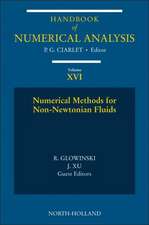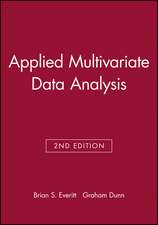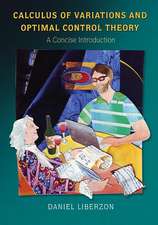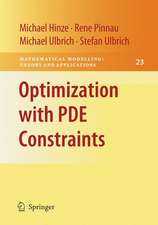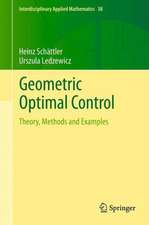Quantum Variational Calculus: SpringerBriefs in Electrical and Computer Engineering
Autor Agnieszka B. Malinowska, Delfim F.M. Torresen Limba Engleză Paperback – 11 dec 2013
Possible applications in economics are discussed. Economists model time as continuous or discrete. Although individual economic decisions are generally made at discrete time intervals, they may well be less than perfectly synchronized in ways discrete models postulate. On the other hand, the usual assumption that economic activity takes place continuously, is nothing else than a convenient abstraction that in many applications is far from reality. The Hahn quantum calculus helps to bridge the gap between the two families of models: continuous and discrete.
Quantum Variational Calculus is self-contained and unified in presentation. It provides an opportunity for an introduction to the quantum calculus of variations for experienced researchers but may be used as an advanced textbook by graduate students and even ambitious undergraduates as well. The explanations in the book are detailed to capture the interest of the curious reader, and complete to provide the necessary background material needed to go further into the subject and explore the rich research literature, motivating further research activity in the area.
Din seria SpringerBriefs in Electrical and Computer Engineering
- 19%
 Preț: 427.20 lei
Preț: 427.20 lei -
 Preț: 377.35 lei
Preț: 377.35 lei -
 Preț: 380.07 lei
Preț: 380.07 lei -
 Preț: 378.12 lei
Preț: 378.12 lei - 20%
 Preț: 379.08 lei
Preț: 379.08 lei -
 Preț: 377.18 lei
Preț: 377.18 lei - 20%
 Preț: 234.68 lei
Preț: 234.68 lei - 20%
 Preț: 232.43 lei
Preț: 232.43 lei -
 Preț: 378.12 lei
Preț: 378.12 lei -
 Preț: 377.18 lei
Preț: 377.18 lei - 20%
 Preț: 231.41 lei
Preț: 231.41 lei -
 Preț: 377.18 lei
Preț: 377.18 lei -
 Preț: 377.95 lei
Preț: 377.95 lei -
 Preț: 444.74 lei
Preț: 444.74 lei -
 Preț: 382.36 lei
Preț: 382.36 lei -
 Preț: 378.12 lei
Preț: 378.12 lei -
 Preț: 378.92 lei
Preț: 378.92 lei - 20%
 Preț: 232.43 lei
Preț: 232.43 lei -
 Preț: 376.80 lei
Preț: 376.80 lei -
 Preț: 377.35 lei
Preț: 377.35 lei -
 Preț: 377.18 lei
Preț: 377.18 lei -
 Preț: 381.00 lei
Preț: 381.00 lei -
 Preț: 376.43 lei
Preț: 376.43 lei -
 Preț: 377.18 lei
Preț: 377.18 lei -
 Preț: 378.54 lei
Preț: 378.54 lei - 20%
 Preț: 321.20 lei
Preț: 321.20 lei -
 Preț: 377.73 lei
Preț: 377.73 lei -
 Preț: 341.75 lei
Preț: 341.75 lei -
 Preț: 344.25 lei
Preț: 344.25 lei -
 Preț: 379.09 lei
Preț: 379.09 lei - 20%
 Preț: 324.64 lei
Preț: 324.64 lei -
 Preț: 377.57 lei
Preț: 377.57 lei -
 Preț: 378.71 lei
Preț: 378.71 lei - 20%
 Preț: 321.66 lei
Preț: 321.66 lei - 20%
 Preț: 230.85 lei
Preț: 230.85 lei -
 Preț: 374.30 lei
Preț: 374.30 lei -
 Preț: 375.45 lei
Preț: 375.45 lei -
 Preț: 360.05 lei
Preț: 360.05 lei -
 Preț: 381.43 lei
Preț: 381.43 lei -
 Preț: 378.34 lei
Preț: 378.34 lei -
 Preț: 376.22 lei
Preț: 376.22 lei - 20%
 Preț: 323.99 lei
Preț: 323.99 lei -
 Preț: 380.07 lei
Preț: 380.07 lei -
 Preț: 375.62 lei
Preț: 375.62 lei - 20%
 Preț: 321.20 lei
Preț: 321.20 lei -
 Preț: 377.18 lei
Preț: 377.18 lei - 5%
 Preț: 361.80 lei
Preț: 361.80 lei -
 Preț: 378.12 lei
Preț: 378.12 lei -
 Preț: 375.07 lei
Preț: 375.07 lei -
 Preț: 376.22 lei
Preț: 376.22 lei
Preț: 349.10 lei
Nou
Puncte Express: 524
Preț estimativ în valută:
66.82€ • 72.61$ • 56.17£
66.82€ • 72.61$ • 56.17£
Carte tipărită la comandă
Livrare economică 16-22 aprilie
Preluare comenzi: 021 569.72.76
Specificații
ISBN-13: 9783319027463
ISBN-10: 3319027468
Pagini: 104
Ilustrații: XVIII, 84 p. 3 illus.
Dimensiuni: 155 x 235 x 5 mm
Greutate: 0.16 kg
Ediția:2014
Editura: Springer International Publishing
Colecția Springer
Seriile SpringerBriefs in Electrical and Computer Engineering, SpringerBriefs in Control, Automation and Robotics
Locul publicării:Cham, Switzerland
ISBN-10: 3319027468
Pagini: 104
Ilustrații: XVIII, 84 p. 3 illus.
Dimensiuni: 155 x 235 x 5 mm
Greutate: 0.16 kg
Ediția:2014
Editura: Springer International Publishing
Colecția Springer
Seriile SpringerBriefs in Electrical and Computer Engineering, SpringerBriefs in Control, Automation and Robotics
Locul publicării:Cham, Switzerland
Public țintă
ResearchCuprins
The Classical Calculus of Variations.- The Hahn Quantum Variational Calculus.- The Power Quantum Calculus.- Conclusion.
Recenzii
From the book reviews:
“The aim of this book is cover the elementary calculus of variations problems in the context of the Hahn quantum calculus and the power quantum calculus. … The book may serve as an introduction to the Hahn quantum calculus or the power quantum calculus … or as a reference for the Euler-Lagrange equations for the associated calculus of variations problems with fixed or free endpoints.” (Roman Šimon Hilscher, Mathematical Reviews, October, 2014)
“The aim of this book is cover the elementary calculus of variations problems in the context of the Hahn quantum calculus and the power quantum calculus. … The book may serve as an introduction to the Hahn quantum calculus or the power quantum calculus … or as a reference for the Euler-Lagrange equations for the associated calculus of variations problems with fixed or free endpoints.” (Roman Šimon Hilscher, Mathematical Reviews, October, 2014)
Notă biografică
Delfim F. M. Torres was born August 16, 1971, in Nampula, Mozambique. He is currently an Associate Professor with Habilitation at the Department of Mathematics, University of Aveiro (UA), Portugal; Coordinator of the group on Mathematical Theory of Systems and Control of the Center for Research and Development in Mathematics and Applications (CIDMA); Director of The Doctoral Program in Mathematics and Applications (PDMA) of the Department of Mathematics of the University of Aveiro (DMAT-UA) and of the Department of Mathematics and Applications of the University of Minho (DMAT-UM), Portugal; Editor-in-Chief of the Int. J. Appl. Math. Stat. (IJAMAS) since 2008; Editor-in-Chief of the Int. J. Math. Stat. (IJMS) from 2007 to 2011; and Associate Editor for several other international journals.
Delfim F. M. Torres received his Diploma ("Licenciatura") honors degree in 1994 on Computer Science Engineering (a 5 years full time course) from University of Coimbra, Portugal. In 1998 he received his M.Sc. on Optimization and Control Theory (2 years full time course), and in 2002 his Ph.D. on Mathematics (3 years full time research), both degrees from UA.
Several M.Sc. dissertations, 5 Ph.D. theses, and 5 post-docs have been successfully finished under his supervision; 5 more Ph.D. theses and 3 post-docs are ongoing. Delfim F. M. Torres has written about 240 scientific and pedagogical publications, including research papers in first class international journals with referee, refereed conference proceedings, chapters in books, and books (as author and also as an editor).
Delfim F. M. Torres has 17 years of excellent teaching experience both to undergraduate and postgraduate students on Mathematics and Science and Engineering, in Portugal and abroad. He has held several positions of Invited Professor in Europe, Africa, and USA. He is a member of Scientific Committees and invited plenary speaker at several international conferences. His current research interests include several topics in the areas of the Calculus of Variations and Optimal Control, Fractional Calculus and Time Scales, and its connections with the Mathematical Theory of Control, Optimization, Epidemiology, and Mathematical Physics.
Delfim F. M. Torres received his Diploma ("Licenciatura") honors degree in 1994 on Computer Science Engineering (a 5 years full time course) from University of Coimbra, Portugal. In 1998 he received his M.Sc. on Optimization and Control Theory (2 years full time course), and in 2002 his Ph.D. on Mathematics (3 years full time research), both degrees from UA.
Several M.Sc. dissertations, 5 Ph.D. theses, and 5 post-docs have been successfully finished under his supervision; 5 more Ph.D. theses and 3 post-docs are ongoing. Delfim F. M. Torres has written about 240 scientific and pedagogical publications, including research papers in first class international journals with referee, refereed conference proceedings, chapters in books, and books (as author and also as an editor).
Delfim F. M. Torres has 17 years of excellent teaching experience both to undergraduate and postgraduate students on Mathematics and Science and Engineering, in Portugal and abroad. He has held several positions of Invited Professor in Europe, Africa, and USA. He is a member of Scientific Committees and invited plenary speaker at several international conferences. His current research interests include several topics in the areas of the Calculus of Variations and Optimal Control, Fractional Calculus and Time Scales, and its connections with the Mathematical Theory of Control, Optimization, Epidemiology, and Mathematical Physics.
Caracteristici
Introduces readers to the treatment of the calculus of variations with q-differences and Hahn difference operators Provides the reader with the first extended treatment of quantum variational calculus Shows how the techniques described can be applied to economic models as well as other mathematical systems Includes supplementary material: sn.pub/extras


